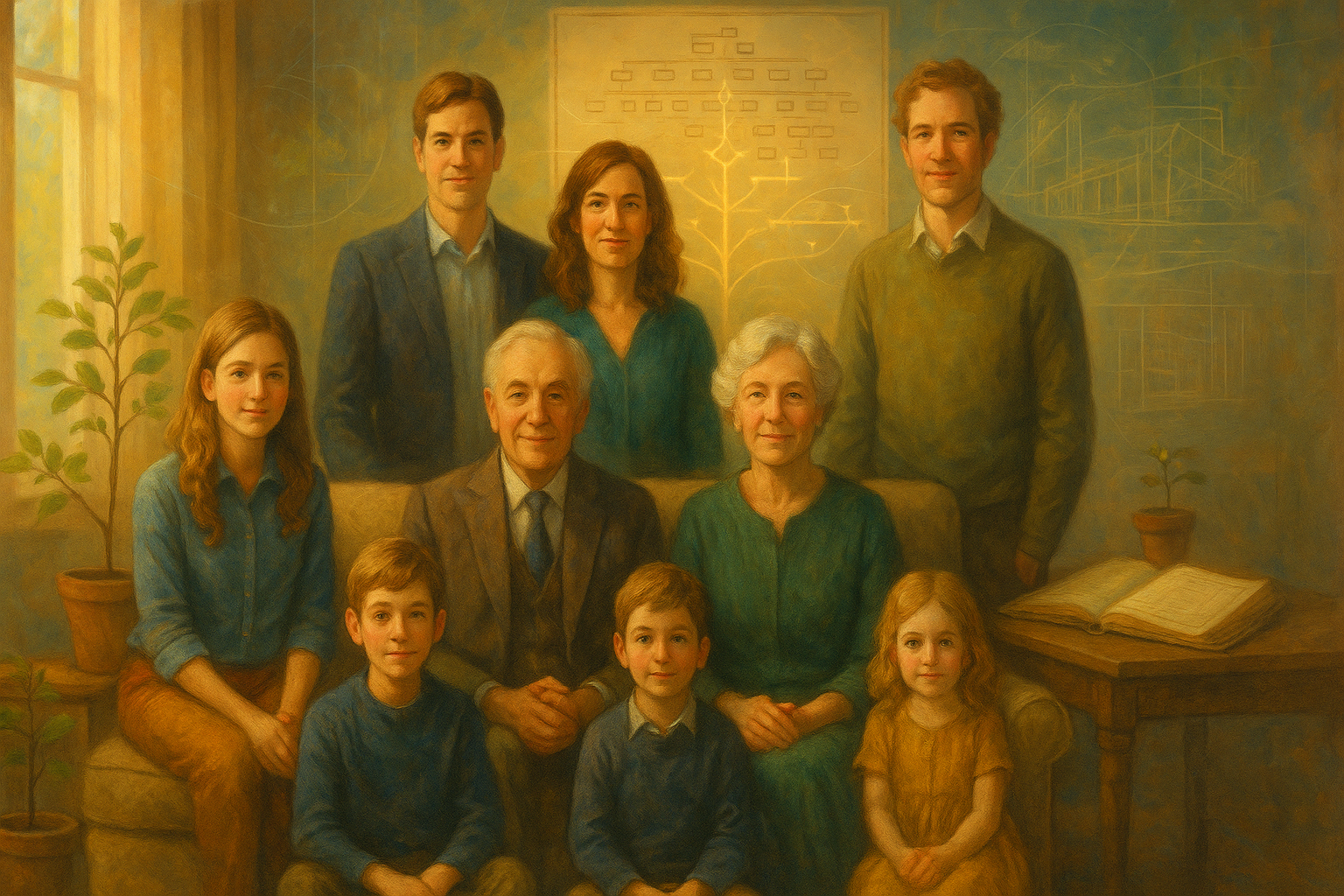Why do family firms sacrifice success to save their legacy?
Duane Ireland, Francesco Chirico, Naveed Akhter, Emanuela Rondi, Rida Ijaz
Audio > Play / Stop
CeFEO's Authors
CeFEO counts more than 50 scholars and 30 affiliated researchers. Several studies and reports have consistently identified CeFEO as a leading research environment worldwide in the area of ownership and family business studies.
This research project, has been co-authored by the following CeFEO Members.
Reference
Spotlight highlights research-based findings only. If you’re interested in exploring this project further or delving into the theoretical and methodological details, we encourage you to contact the authors or read the full article for a comprehensive understanding.

Ireland, R. D., Chirico, F., Akhter, N., Rondi, E., & Ijaz, R. (2025). The show must go on: Preserving the legacy business through exit in family business portfolio firms. Academy of Management Perspectives.
https://doi.org/10.5465/amp.2023.0293

What is Spotlight?
Spotlight is an innovative online family business magazine designed to bridge the gap between cutting-edge research and the real-world needs of practitioners, owners, and policymakers. Drawing on the latest findings from the Centre for Family Entrepreneurship and Ownership (CeFEO) at Jönköping International Business School, Spotlight delivers insightful, accessible summaries of key research topics. Our mission is to keep the family business community informed and empowered by offering actionable insights, expert analyses, and forward-thinking strategies that enhance business leadership and ownership practices for long-term success.

This article is brought to you by the WIFU Foundation
Spotlight is generously supported by the WIFU Foundation, which promotes research, education, and dialogue in the field of family business. This partnership enables us to continue bridging academic insights and real-world practice for the advancement of responsible family entrepreneurship and ownership.
When crisis strikes, why do family businesses hold on to struggling legacy ventures?
Family business owners often find themselves in a paradox: when their portfolios falter, they frequently choose to protect their legacy business—the original venture that embodies family history and values—even if it is losing money. This study of four Pakistani family business portfolios reveals that families sometimes divest profitable satellite businesses to save underperforming legacies. Emotional ties, especially guilt, sadness, and fear, heavily influence these choices. The findings shed light on how sensemaking and emotional attachment drive exit decisions, offering valuable lessons for family business leaders worldwide.
Family business owners often find themselves in a paradox: when their portfolios falter, they frequently choose to protect their legacy business—the original venture that embodies family history and values—even if it is losing money. This study of four Pakistani family business portfolios reveals that families sometimes divest profitable satellite businesses to save underperforming legacies. Emotional ties, especially guilt, sadness, and fear, heavily influence these choices. The findings shed light on how sensemaking and emotional attachment drive exit decisions, offering valuable lessons for family business leaders worldwide.
For most businesses, exit is about numbers: performance metrics, market opportunities, and return on investment. But for family businesses, the calculus is more complex. Strategic decisions are infused with history, identity, and emotion. The family name, reputation, and legacy weigh as heavily as financial outcomes.
While research has examined exits in single-venture family firms, much less is known about family business portfolio firms—families who own and manage multiple businesses simultaneously. These firms are particularly prominent in emerging economies, where entrepreneurial families diversify across industries to spread risk and capture opportunities. Yet diversification also raises difficult questions: when one business falters, which should be saved, and which should be sold or closed?
This study—by Ireland, Chirico, Akhter, Rondi, and Ijaz (2025)—delves into that very question. Focusing on Pakistani family business portfolios, it reveals a striking pattern: even when satellite businesses outperformed the legacy, families overwhelmingly chose to retain the legacy at all costs. The “show must go on” mentality underscores the deep emotional pull of legacy, but also exposes firms to paradoxical risks .
What We Studied
The research team conducted a qualitative, longitudinal multiple-case study of four Pakistani family business portfolios, encompassing 34 businesses and 19 exits. The sample was deliberately chosen to capture multigenerational family firms that:
- Managed multiple businesses (legacy + satellites).
- Encountered performance decline.
- Had undergone one or more business exits.
Data Collection
- 36 in-depth interviews with family owners and executives.
- 245 hours of field observation at family meetings, business sites, and informal gatherings.
- Archival materials (company documents, websites, news articles).
The interviews were primarily conducted in Urdu, supplemented by Punjabi and English, ensuring cultural depth. These conversations were not just formal—they included family dinners, informal office chats, and observations of emotional moments.
Analytical Lens: Sensemaking
The study used the concept of sensemaking (Maitlis & Christianson, 2014)—the process through which people interpret unexpected events that violate their expectations. For family owners, performance decline was the trigger. How they “made sense” of this disruption—through emotions, identity, and family history—shaped their choices of which businesses to exit.
Key Insights
1. Triggering Phase: Framing the Crisis
The exit process began with a triggering event: a decline in performance or an external shock. Families framed these crises as threats not only to profitability but to family honor and continuity.
- Maks Family (Marketing & Distribution legacy): When their satellite auto parts venture collapsed financially, it dragged down the legacy as well. One director recalled: “It was vital to consider closing down one of the heavily invested businesses… otherwise, our father’s business could not survive.”
- Ravi Family (Construction legacy): After a bird flu epidemic devastated their poultry business, losses cascaded into their construction legacy. The director reflected: “We have to keep coming back to the things by sacrificing them temporarily… so that we might leave our name for the next generation.”
Trigger events forced families to ask: which businesses could be sacrificed to buy time and resources for the legacy?
2. Evaluating Phase: The Power of Emotions
Once crises emerged, families evaluated their options. Here, emotions dominated reasoning. The study identified three key emotions:
- Guilt (Indebtedness to the Past): Owners felt they owed it to their ancestors not to abandon the legacy. One Safi family member described his mother’s questions about the dairy business: “I felt strongly that something had to be initiated to stabilize things… otherwise, I would feel guilty.”
- Sadness (Nostalgia for Better Times): Families remembered the hard work, sacrifices, and stories tied to the legacy. Ravi’s director recalled his late brother, co-founder of the business: “Memories attached to the business make me sad about not owning it in the future.”
- Fear (Of Being the Generation That Failed): Owners dreaded being remembered as the ones who “lost” the family business. Maks’ owner admitted: “One of my primary fears was the failure of the business and the consequences we would have to face as a family.”
These emotions acted as powerful anchors, often outweighing rational economic logic.
3. Selecting Phase: Choosing Legacy Over Opportunity
Finally, families made their exit decisions. Almost invariably, they chose to preserve the legacy business and shed satellite businesses—sometimes even those with higher growth potential.
- Safi Family (Dairy Distribution legacy): Despite losses in dairy, they exited their media ventures, saying: “We wouldn’t want to waste the hard work of my father and the family by running into problems where we would eventually face the closure of the dairy business.”
- Ravi Family (Construction legacy): They closed a flourishing pharmaceutical satellite to save their indebted construction core. “It is hard to close down a profitable business,” one owner admitted, “but we couldn’t see any other option.”
- Noor Family (Automotive legacy): The one exception: they sold their automobile repair workshop to cousins, thus preserving legacy within the extended family. This allowed them to grow into dealerships while keeping emotional ties intact.
This paradox—divesting profitable ventures to retain failing ones—illustrates how legacy preservation can overshadow economic rationality.
Takeaways for Family Business Owners
1. Legacy: A Double-Edged Sword
Legacy is a source of pride, continuity, and resilience. But it can also constrain renewal. Families may cling to it even when it jeopardizes the broader portfolio. Recognizing this dual nature is critical.
2. Emotions Intensify Across Generations
Contrary to the assumption that successors care less about legacy, the study found that emotional attachment grew stronger in later generations. Grandchildren and great-grandchildren were often more reluctant to let go than founders.
3. Exit Is Not Failure—It’s Strategy
Families used exits not as surrender but as a strategic resource reallocation tool. By divesting satellites, they freed resources to sustain the legacy. Seen this way, exit becomes part of continuity, not merely loss.
4. Watch for the “Paradox of Preservation”
While protecting the legacy, families sometimes sacrificed profitable ventures that could have secured long-term survival. This paradox highlights the importance of balancing heart and head.
Impact
For Family Firms
The study underscores that family firms are not just economic actors—they are custodians of history. This makes them resilient but also vulnerable to emotional traps. By recognizing how guilt, sadness, and fear shape decisions, families can build governance mechanisms (like independent boards) to balance sentiment with strategy.
For Competitors
Rivals should anticipate that family firms will often double down on preserving their legacy, even if it makes little financial sense. This may create both opportunities and risks in competitive markets.
For Policymakers
Family firms form the backbone of many economies, particularly in emerging markets. Policymakers could design training and advisory programs to help families evaluate legacy preservation more objectively, balancing emotional heritage with economic renewal.
Recommendations
- Make Emotions Explicit – Families should acknowledge and openly discuss how guilt, sadness, and fear influence decision-making.
- Build Counterweights – Independent advisors or boards can provide rational perspectives when emotions dominate.
- Develop Exit Readiness Tools – Metrics (financial and emotional) could help signal when the costs of preserving a legacy business become unsustainable.
- Consider “Legacy Preservation Beyond Ownership” – Like the Noor family, families might divest legacies within the extended family, maintaining emotional continuity while freeing resources.
- Policy Support – Training in resource orchestration, governance, and strategic renewal could empower families to navigate exits without undermining legacy or long-term survival.

CeFEO's Authors
CeFEO counts more than 50 scholars and 30 affiliated researchers. Several studies and reports have consistently identified CeFEO as a leading research environment worldwide in the area of ownership and family business studies. This research project, has been co-authored by the following CeFEO Members.
Reference
Spotlight highlights research-based findings only. If you’re interested in exploring this project further or delving into the theoretical and methodological details, we encourage you to contact the authors or read the full article for a comprehensive understanding.

Ireland, R. D., Chirico, F., Akhter, N., Rondi, E., & Ijaz, R. (2025). The show must go on: Preserving the legacy business through exit in family business portfolio firms. Academy of Management Perspectives.
https://doi.org/10.5465/amp.2023.0293

What is Spotlight?
Spotlight is an innovative, AI-powered, online family business magazine designed to bridge the gap between cutting-edge research and the real-world needs of practitioners, owners, and policymakers. Drawing on the latest findings from the Centre for Family Entrepreneurship and Ownership (CeFEO) at Jönköping International Business School, Spotlight delivers insightful, accessible summaries of key research topics. Our mission is to keep the family business community informed and empowered by offering actionable insights, expert analyses, and forward-thinking strategies that enhance business leadership and ownership practices for long-term success.

This article is brought to you by the WIFU Foundation
Spotlight is generously supported by the WIFU Foundation, which promotes research, education, and dialogue in the field of family business. This partnership enables us to continue bridging academic insights and real-world practice for the advancement of responsible family entrepreneurship and ownership.












